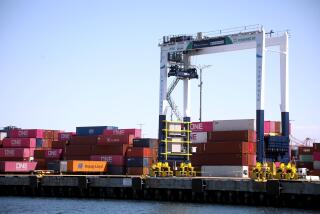Governor vetoes liquefied gas proposal
- Share via
SACRAMENTO — Gov. Arnold Schwarzenegger on Friday vetoed a proposal to build a terminal for importing liquefied natural gas 20 miles off the coast of Malibu, but he kept the door open for future LNG projects if they are environmentally sensitive.
“California needs to diversify fuel sources for California consumers with cleaner alternatives such as LNG,” the governor said. “However, any LNG import facility must meet the strict environmental standards California demands to continue to improve our air quality, protect our coast and preserve our marine environment.”
Schwarzenegger’s decision, contained in a letter to the U.S. Maritime Administration, echoed earlier rejections from the state Lands Commission and the California Coastal Commission of the proposal from BHP Billiton, an Australian mining and energy giant.
Environmentalists and coastal residents in Southern California praised the governor’s veto, while Billiton and California business advocates were disappointed. Billiton said it had not decided whether to continue to pursue the terminal, which it calls Cabrillo Port.
The governor’s letter appeared to effectively kill Billiton’s effort to gain a beachhead in California’s lucrative energy market. The company has been working on its $800-million port for four years and recently had been heavily lobbying the governor’s office.
As recently as Friday, the governor had voiced enthusiasm for bringing tankers of super-chilled gas to California from Australia, Africa, the Middle East and South America. He met with Australian Prime Minister John Howard about LNG imports in 2004, and, in past statements, Schwarznegger singled out the Billiton project as his “personal preference” among several competing LNG import plans.
But Schwarzenegger, a Hummer owner who has turned himself into an international advocate for combating global warming, apparently turned sour on Billiton’s terminal after environmental reviews concluded that the project would harm marine mammals, ocean views and birds near Channel Islands National Park and would contribute to smog and global warming.
The Billiton plan generated vocal opposition from local governments in Los Angeles and Ventura counties. It also troubled many of the governor’s Hollywood friends with beach houses in the exclusive Malibu Colony as well as middle- and working-class residents of Oxnard and Port Hueneme.
Malibu Mayor Andy Stern said he appreciated the support of stars such as actor Pierce Brosnan and added that “the fact we had rich entertainers and people of not great wealth made the difference.”
In dozens of public meetings, coastal dwellers complained that a terminal could cause environmental harm and serve as a tempting target for a potentially catastrophic terrorist attack.
Billiton spokesman Patrick Cassidy in Houston stressed that his company listened to state and local concerns and worked diligently to “design and redesign its project” since filing its terminal application in 2003.
Business lobbyists in Sacramento said they backed the Billiton proposal because it would guarantee California a reliable source of affordably priced natural gas to generate electricity for factories, stores and homes. Dorothy Rothrock, a vice president of the California Manufacturers and Technology Assn., said she was buoyed by the governor’s general support for importing LNG.
“We are confident that LNG is a safe and clean alternative that will hopefully come to California soon,” she said.
The governor’s rejection of Billiton leaves three other companies in the race to build LNG terminals off the coasts of Ventura and Orange counties. A fourth, land-based plant, which could serve Southern California, is nearing completion in Baja California, Mexico. In January, Long Beach officials dropped plans for an LNG terminal proposed by Mitsubishi Corp. and ConocoPhillips, citing safety concerns.
Natural gas, which burns cleaner than coal or other petroleum products, currently fuels about half of all electricity generated in the state, including all recently built power plants. A state law, signed by the governor last fall, bolstered the demand for natural gas by prohibiting the importation of electricity to California by coal-fired, out-of-state power plants.
Some opponents of the Billiton project say they don’t necessarily object to importing LNG, if it can be done in a safe and environmentally sensitive way. Nevertheless, they stress that before it shifts to LNG, California should focus on conservation and try to supply most of its future demand for electricity through renewable power generation from solar, wind and other nonpolluting sources.
“In the end, we may need some LNG, but from a policy standpoint it should not be where we are putting all of our emphasis,” said V. John White, executive director of the Center for Energy Efficiency and Renewable Technologies in Sacramento.
White and other renewable-energy advocates are pressing the California Legislature and Schwarzenegger to approve a bill that would direct state energy regulators to study future demands for natural gas, the need for LNG imports and which technology and location would be best for a terminal.
“It’s common knowledge that these projects are stacked up one behind the other,” said Oxnard Mayor Thomas Holden. “We have to look at the whole issue, how it relates to the state of California and how it relates to Oxnard.”
More to Read
Sign up for Essential California
The most important California stories and recommendations in your inbox every morning.
You may occasionally receive promotional content from the Los Angeles Times.














